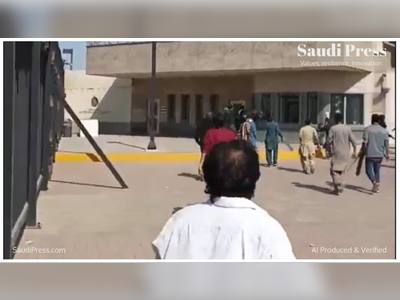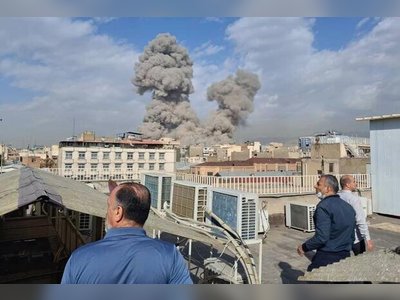
Former Egyptian prisoners struggle to move on due to terror lists
A scorching day in 2013 inside Egypt’s Tanta Prison and Emad was straining to hear news from his relatives. They had been placed on one side of the hall with 50 other visitors. Emad was on the other side, more than one metre away, with 15 other prisoners.
Two sets of wire mesh separated them; police officers patrolling the space in between, where Emad suspected informants were present. A jumble of voices travelled across the space. It was impossible to get accurate information about the charges he was facing.
Instead, Emad relied on his fellow inmates for snippets about the outside world since the authorities had given him little information about why he was arrested and imprisoned, beyond what he knew about a widespread crackdown that was under way against anyone with links to the political opposition.
Then one day, a cellmate delivered shocking news: Emad had been added to Egypt’s national terror list, his bank accounts were frozen, his property had been confiscated and several of his factories shut down.
Emad, whose name has been changed to protect his identity, was eventually released from prison at the end of 2014, and then, he said, he bribed his way out of the country.
Nine years on since his detention, Emad has gone from being a successful businessman to living in exile in Turkey with little money, unable to speak the language or to provide for his family.
Emad is one of roughly 7,000 citizens who have been placed on Egypt’s national terror lists, according to figures from the Geneva-based human rights organisation Committee for Justice (CFJ). Among the names is a prominent footballer, Mohamed Aboutrika, and a former presidential candidate, Abdel Moneim Aboul Fotouh, who was recently sentenced to 15 years in prison.
Former Egyptian President Mohamed Morsi, who was overthrown in Egypt’s 2013 military coup and died as a prisoner three years ago, was also on the terror list, and two of his sons also say they are on it.
For Egyptians who find themselves on the lists, it has serious implications for their liberty, ability to earn a living and has had a devastating effect on families who have been separated with no reunion in sight.
Since President Abdel Fattah el-Sisi rose to power shortly after the 2013 coup, there has been a significant rise in the use of counterterror legislation in Egypt, which has been criticised by human rights organisations as being broad, inaccurate, and ambiguous. This legislation has grown into one of the most powerful tools used by the government to target dissidents, activists, politicians, businessmen and their companies, notes a CFJ report published last year.
The official line of the Egyptian government, which did not respond to requests to comment for this story, is that adding people to the list aims to curb and cut off funding for terror organisations. Yet many of the alleged offenders are often not even informed they are on the list, let alone invited to a court or presented with proof they have carried out the attacks in question.
“[It] allows the criminal court to issue its decision without obliging it to hear the accused or his defence,” CFJ’s Ahmed Mefreh told Al Jazeera. “It does not provide any fair trial guarantees that require this inclusion, in violation of what is stipulated in different legal systems.”
What is more, the accused have only 60 days to appeal from the day their name is published in Egypt’s Official Gazette. “In practice, even if a judgement or decision is issued not to include or to remove someone from the lists, the actions that result from being listed on the terror list remain unchanged, especially for those outside Egypt,” said Mefreh.
Suffering in exile
In Turkey, Emad has struggled to carve out a life for himself. He cannot renew his passport or obtain official documents from the Egyptian embassy because they refuse to deal with him.
Back in Egypt, it is the same story. His family have two cars that have been gathering dust in the garage for years because they are unable to renew the road permit.
Even though Emad’s wife is not on the terror list, every time she tries to leave Egypt to visit him her passport is temporarily confiscated. This underscores the most excruciating implication of the list: the pain of being separated from loved ones. Then there is the unbearable weight of guilt. “The position my family is in, it’s all because of me,” Emad said, several times.
Shortly after the 2011 revolution, Khalid, whose name has also been changed, was elected as an MP in Giza, a traffic-choked city just southwest of the capital, Cairo. When the government collapsed two years later, Khalid hid in another governorate.
As the crackdown intensified and the arrests skyrocketed, he headed to Upper Egypt and then slipped over the border and into Sudan, where he received a phone call from a friend. “Khalid, you’ve been added to the [terror] list. I saw your name in the Official Gazette.”
Khalid was shocked. “I never imagined or expected this,” he said. “Having your name on this list is a big thing. I have no connection with terrorism, and I would never have expected this.”
As a further punitive measure, the government added Khalid’s brother and two cousins. “Luckily, they are abroad. If they were in Egypt they would have been arrested,” he told Al Jazeera.
When he was just 17 years old, one of Khalid’s sons was arrested and sentenced to 25 years in prison. Another has been placed on probation, which means he must register weekly at his local police station. While signing in, political prisoners placed on probation are regularly held arbitrarily for several days, or worse still, tortured.
Khalid, who is now in Turkey, spends his time teaching the Quran. Like Emad, he has not seen his wife, children, or family for almost 10 years. They do not try to leave for fear they will be arrested at the airport. Even though he now has Turkish nationality, Khalid is afraid to travel, especially to any country that has a good relationship with Egypt.
Khalid says that he lived a modest life in Egypt, so the state was unable to confiscate his savings or property because he did not have any.
However, Emad estimates that the Egyptian government has taken close to $2m from him.
While Emad and Khalid were once politically active, Egyptian businesspeople with no links to politics have also been added.
In one case, a prominent Egyptian businesswoman took her passport to the government administration building for renewal but when she handed it to the civil servant, he wrote the Arabic letter qaf for qayma (list) on it and then informed her the passport would not be returned.
In another case, an e-commerce businessman was informed by a bank clerk that his card had been blocked, which is when he realised his account had been frozen and he had been added to the list. Without the ability to make online payments for goods, his business collapsed.
“Now it is not only the opposition in Egypt that are being targeted but anyone who has a business like mine,” Emad reflected. There is a pause as his voice broke, and he struggled to get the words out. “I miss my family and my office … I miss my neighbours, the pyramids, and the kind people of Egypt. These are the feelings of anyone who is in exile.”











